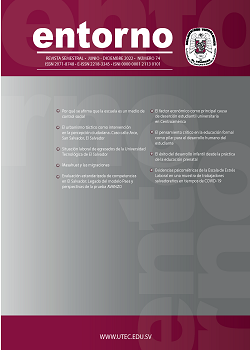Published 2022-12-09
Keywords
- Space use – Housing,
- El Salvador – Social conditions,
- Human territoriality,
- Home economics,
- Street vendors
Copyright (c) 2022 Entorno

This work is licensed under a Creative Commons Attribution-NonCommercial-ShareAlike 4.0 International License.
How to Cite
Abstract
For people, a house is a refuge which allows them to rest and live with other human beings; its main function is to satisfy the basic needs of its dwellers. Nonetheless, day-to-day reality shows that not everybody owns a house which can fully satisfy their needs; as a consequence, these people resort to those places that make them feel comfortable and identified. In addition to being part of the city structure, public places are a space where--at a specific moment-- feelings, emotions, meanings, and perceptions meet; those from strangers, passers-by, and people who do not know each other and who, from their own individuality, share [their lives] with the collective. As a result of said interaction, public spaces are built and rebuilt every day, according to the needs of those who inhabit them. This study is focused on the analysis of the existing relationship between housing and the public spaces in Historic Downtown San Salvador (CHSS, given its Spanish acroynym). A qualitative approach was used; two different perspectives were evidenced: public spaces as an extension of the dwellings, and public spaces as homes. The anthropological nature of downtown San Salvador makes it possible to address the link between the user and the public space; a perspective from which CHSS constitutes a historical, identitarian, and relational place which gives a sense of belonging and appropriation to the Salvadoran population.

